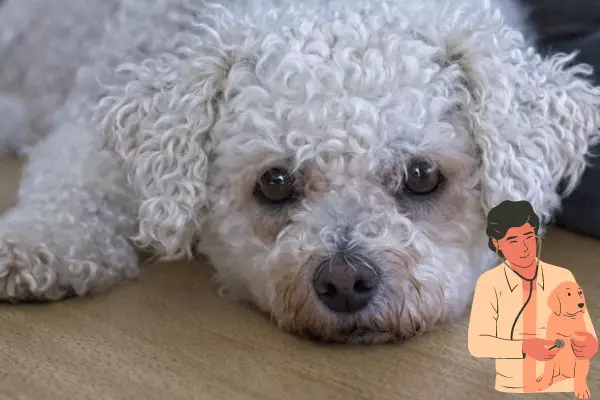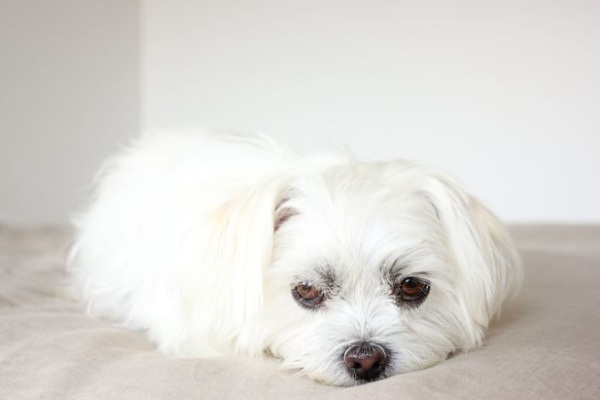7 Common Bichon Frise Health Issues You Should Know

Most small breeds of dogs suffer similar health challenges, so let’s look at Bichon Frise health issues associated with this cute pup.
We will outline and discuss some of the most common health challenges associated with Bichon Frise and outline symptoms associated with each health.
Since we don’t encourage self-medication of pets, we will not discuss the treatment for these health challenges, therefore, we advise you to see a veterinarian when you see the signs listed on this page.
We will also outline ways to improve your Bichon Frise health so that some of these health challenges can be avoided.
Bichon Frise Health Issues
Canine hip dysplasia, patellar luxation, allergies, gum diseases, cataract, eye discharge, and hormonal disorders are the most common health issues associated with Bichon Frise.
Let’s break down the above-listed health challenges associated with Bichon Frise.
Here are the most common Bichon Frise health problems that have been linked to Bichons:
1. Patellar luxation
Patellar luxation occurs when a Bichon Frise’s patella (kneecap) is displaced from its normal anatomic position in the thigh-bone groove (femur).
When the kneecap is dislocated from the thigh bone’s groove, the animal’s quadriceps muscles must relax and extend in order for it to return to its normal position.
As a result, most Bichon Frise with the condition will lift their back legs for a few minutes.
In this instance, immediate medical attention or treatment is required. The dog might be disabled for the rest of its life if this isn’t done.
Symptoms of patellar luxation in Bichon Frise
The symptoms of patellar luxation in Bichon Frise include the following:
- Sudden limping of fore or hinds legs
- Carrying a leg or legs abnormally.
- The knee is unable to bend.
- When moving the leg, it causes pain.
- Will not be able to sprint or leap.
- Refusing to work out.
- Swelling of knee cap area.
- Legs that are weak and unable to move.
Causes of patellar luxation in Bichon Frise
Here are the common causes of patellar luxation in Bichon Frise:
- Injury or accidents
- Genetic malformation
- Damages the knee ligaments
- Hereditary deformity
2. Hip dysplasia
Hip dysplasia refers to a hip socket that does not entirely enclose the ball section of the upper thighbone in Bichons.
The hip joint might become partly or totally dislocated as a result of this. Hip dysplasia affects the majority of Bichons from birth.
Hip dysplasia is one of the most common Bichon Frise issues, so keep a watch on your dog.
Hip dysplasia causes the soft tissues that surround a puppy’s joints to grow incorrectly.
The bones start to separate and are no longer held together by the ligaments.
As the puppy grows, the two bones lose contact with one another, producing a problem. Typically, signs do not develop until the Bichon Frise is well into adulthood.
Symptoms of hip dysplasia in Bichons
Here are some common symptoms of hip dysplasia in Bichons:
- Stiffness or limping of Bichon Frise.
- Reduced activity in Bichon Frise.
- Range of motion has been reduced.
- Raise, leap, sprint, or climb steps with difficulty or reluctance
- The gait is swaying and “bunny hopping.”
- During movement, the joint grates.
- Muscle mass loss in the thighs
Causes of hip dysplasia in Bichons
Here are some common causes of hip dysplasia in Bichon Frise:
- Hereditary
- Excessive growth rate
- Genetic predisposition
- Excessive types of exercise
- Improper weight and nutrition
3. Allergies
Allergies are at the top of the list of health problems inherited by Bichons from their parents. In the Bichon Frise breed, this is perhaps the most frequent health issue.
If your Bichon has allergies, you’ll notice that she’s itchy and scratches a lot, and she may even bite herself.
Look for an inflamed location on your dog’s skin, as well as a place where her hair is falling out.
Bichons are commonly sensitive to food, objects they come into contact with within their surroundings, and seasonal allergies, similar to hay fever.
Symptoms of allergies in Bichon Frise
Here are some symptoms of allergic reactions in Bichon Frise:
- Itching of the skin.
- Wheezing
- Swollen paws
- Paw chewing
- Sneezing
- Runny discharge from the eyes
- Runny discharge from the nose.
- Rashes on skin.
Causes of allergies in Bichon Frise
Here are some common things that can trigger off or cause allergic reactions in Bichon Frise:
- Certain kinds of food
- Fleas
- Pollutants
- Mites
- Dust
- Flower pollen
4. Mouth and gum disease
Gum disease and poor dental hygiene can lead to more significant health issues such as heart disease and renal failure. You don’t want your Bichon’s teeth to fall off!
Fortunately, this is a problem that you can address. Most dental disorders and related medical concerns may be avoided if you wash your dog’s teeth, avoid table meals and soft foods, and have your doctor clean your dog’s teeth when required.
Gum disease and tooth damage are particularly frequent in Bichon Frise dogs. This occurs when bacteria enter their bodies.
It’s essential to brush their teeth correctly at least once every 30 days or take them to a dentist for a tooth cleaning to avoid such problems.
Symptoms of dental diseases in Bichons
Here are some common symptoms of dental diseases in Bichons:
- Discolored teeth (brown or yellow)
- Bad breath.
- Reduced appetite
- Inflamed or bleeding gums.
- Loose or missing teeth.
- Excessive drooling.
- Blood on chew toys or in water bowl.
- Favoring one side of the mouth when chewing.
- Irritability.
Causes of dental diseases in Bichons
Here are some common causes of dental diseases in Bichons:
- Tartar on the teeth
- Build-up of plaque
- Injury
- Tooth fracture
- Enamel abnormality
- Tooth decay
5. Ear infections
Ear infections are common in Bichon Frises because of their ear canals size.
Ear glands swell and produce more wax than usual to battle infections.
This produces an overproduction of ear tissue, constricting and inflaming the canal.
In extreme cases, the eardrum may burst, causing your dog a great deal of pain!
Excessive ear scratching and ear redness are red signals that there is a problem.
Symptoms of ear infections in Bichons
Here are some common symptoms of ear infections in Bichons:
- Ear redness
- Excessive ear scratching
- Discharge from eye
- Restlessness
- Excessive shaking of head
Causes of ear infections in Bichons
Here are some common causes of ear infections in Bichons;
- Tumors
- Bacteria
- Fungus
- Mites
- Foreign objects lodged in the ear
6. Urinary tract issues
Your Bichon’s urinary system is important for removing wastes from her body, as well as regulating the water and electrolytes in Bichon’s body.
The urinary system also aids in the maintenance of healthy blood pressure and the processing of vitamin D, which is essential for a strong immune system.
Some urinary tract issues are hereditary, while others are caused by trauma, sickness, or toxic exposure.
Your Bichon could have bladder stones or a urinary tract infection if he pees a lot, has a lot of bladder infections, and starts having “accidents” in the home.
Symptoms of urinary tract issues in Bichons
Here are some common symptoms of urinary tract issues in Bichons:
- Straining to urinate.
- Increased frequency of urination.
- Blood in the urine.
- Cloudy or strong-smelling urine.
- Reduced quantity of urine.
- Accidents inside your home.
Causes of urinary tract issues in Bichons
Here are some common causes of urinary tract issues in Bichons:
- Bacteria
7. Hormonal disorders
Hormones are like small messengers in your dog’s body, telling different areas of her body what to do. Hormonal changes can lead to excessive barking.
They assist in maintaining balance and inform various organs what to perform and when to do it.
Insulin, estrogen, and progesterone are three hormones that you are undoubtedly familiar with.
Insulin regulates blood sugar levels, whereas estrogen and progesterone control the reproductive systems.
Other hormones exist, and they all play a crucial role in your dog’s health. Your dog will get a hormone issue if his hormones are out of balance.
Symptoms of hormonal disorders in Bichons
Here are some common symptoms of hormonal disorders in Bichons:
- Gaining weight without increase in appetite
- Sleepiness and a lack of motivation to engage in physical activity
- Intolerance to the cold
- Hair that is dry, lifeless, and prone to shedding
- Hair coat that is very thin to practically bald
- Darkening of the skin’s pigmentation
- Skin and ear infections are more likely to arise as a result of the increased vulnerability.
- Hair that doesn’t come back after being clipped or shaved
- High cholesterol levels in the blood
- Heart rate that is low
Causes of hormonal disorders in Bichons
Here are some common causes of hormonal disorders in Bichons:
- Hypothyroidism
- Effects of drugs
- Age
- Elevated male sex hormones
- Overproduction or excess of a hormone
- Producing too much thyroid hormone
- Elevated female sex hormones
Bichon Frise Old Age Problems
Excessive shedding, loss of coordination, decreased appetite, house accidents, loss of interest in favorite activities, and partial loss of memory are the most common Bichon Frise old age problems.
Most of these signs can be managed with the help of your veterinarian, however, there are some common signs your dog is dying of old age you should know.
How to improve your Bichon Frise health
Here are some common ways to improve your Bichon Frise health status:
- Keep your Bichon Frise free from parasites.
- Food preservatives should not be fed to your Bichon Frise.
- Groom your dog on a regular basis.
- Get your dog vaccinated.
- Increase the antioxidants intake of your dog.
- Feed your dog a balanced and nutritious diet
- Keep your dog’s teeth healthy
- Make an appointment with your veterinarian on a regular basis
Read more about how to improve your dog’s health here.


![Hairballs in Dogs [Causes, Signs & Remedies] Hairballs in Dogs](https://petcreeks.com/wp-content/uploads/2023/12/pexels-anna-bondarenko-7391070.jpg)
![How to Treat a Broken Dog Nail [A Step By Step Guide] How to Treat a Broken Dog Nail](https://petcreeks.com/wp-content/uploads/2023/09/igor-bumba-V9JMh9A-10E-unsplash.jpg)


